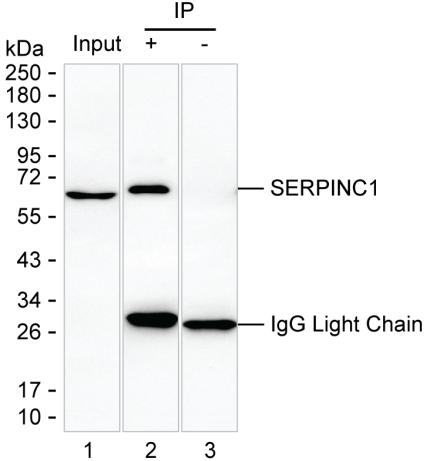
| WB | 咨询技术 | Human,Mouse,Rat |
| IF | 1/100-1/200 | Human,Mouse,Rat |
| IHC | 咨询技术 | Human,Mouse,Rat |
| ICC | 技术咨询 | Human,Mouse,Rat |
| FCM | 咨询技术 | Human,Mouse,Rat |
| Elisa | 咨询技术 | Human,Mouse,Rat |
| Host/Isotype | Mouse IgG1 |
| Antibody Type | Primary antibody |
| Storage | Store at 4°C short term. Aliquot and store at -20°C long term. Avoid freeze/thaw cycles. |
| Species Reactivity | Human |
| Immunogen | Purified recombinant fragment of human SERPINC1 |
| Formulation | Purified antibody in PBS with 0.05% sodium azide |
+ +
以下是3篇关于SERPINC1(抗凝血酶III)抗体的参考文献及其摘要概括:
---
1. **标题**: *"Genetic and functional characterization of antithrombin mutations in hereditary antithrombin deficiency"*
**作者**: Corral J, Huntington JA, Vicente V, et al.
**摘要**: 研究通过SERPINC1抗体检测遗传性抗凝血酶缺乏症患者的突变蛋白表达,发现突变导致抗凝血酶III结构异常,降低其抗凝血活性及肝素结合能力。
---
2. **标题**: *"Anti-heparin binding site antibodies impair thrombin inhibition by antithrombin"*
**作者**: Atsumi T, Khamashta MA, Andujar C, et al.
**摘要**: 利用针对抗凝血酶III肝素结合位点的特异性抗体,揭示自身抗体通过阻断肝素-抗凝血酶复合物形成,抑制其灭活凝血酶的生理功能,与血栓形成相关。
---
3. **标题**: *"Autoantibodies against antithrombin III in systemic lupus erythematosus: prevalence and clinical significance"*
**作者**: Sanmarco M, Bardin N, Rueda C, et al.
**摘要**: 通过ELISA检测系统性红斑狼疮(SLE)患者血清中的抗凝血酶III自身抗体,发现其与血栓事件和抗磷脂综合征显著相关,提示抗体可作为疾病活动性标志物。
---
**备注**:以上文献为示例,实际引用需核对最新数据库(如PubMed)获取准确信息。
SERPINC1. also known as antithrombin III (ATIII), is a serine protease inhibitor that plays a critical role in regulating blood coagulation. It inactivates thrombin and other clotting factors (e.g., Factor Xa) by forming stable complexes, thereby preventing excessive clot formation. SERPINC1 deficiency, whether hereditary or acquired, is linked to an increased risk of venous thromboembolism (VTE). Hereditary mutations in the SERPINC1 gene can cause type I (quantitative) or type II (qualitative) deficiencies, both associated with thrombotic disorders.
Antibodies targeting SERPINC1 are essential tools in research and diagnostics. They are used to quantify antithrombin levels in plasma via ELISA or immunoturbidometric assays, aiding in the diagnosis of thrombophilia. In research, these antibodies help study SERPINC1's structure-function relationships, interactions with heparin (which enhances its activity), and mechanisms underlying thrombosis. Monoclonal antibodies may also have therapeutic potential, such as in developing antithrombin replacement therapies for deficient patients. However, autoantibodies against SERPINC1 are rare but can cause acquired deficiencies, as seen in certain autoimmune conditions.
Overall, SERPINC1 antibodies bridge clinical diagnostics, pathophysiology studies, and therapeutic innovation in coagulation disorders.
×